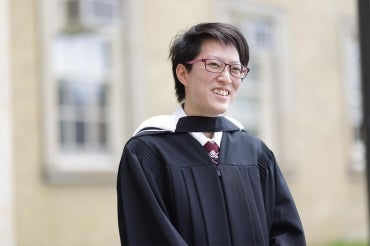With her prof's emotional support, U of T grad achieves 'dream' of earning degree

Published: June 10, 2022
Alaina Luk describes her childhood as difficult. With two high-achieving older siblings, she grew up in a world of hand-me-downs – from clothes to expectations.
She also struggled in school and found it difficult to understand verbal instructions only to later realize she was experiencing symptoms of autism spectrum and attention deficit disorder.
“I felt like I didn’t belong anywhere – like I didn’t matter,” she says.
But her life began to change after she attended college and was accepted to the University of Toronto Scarborough. In her second year, she took an English course taught by Maria Assif, who makes it a priority to talk to every one of her students outside of her office hours – and to have those conversations early in the semester. They’re brief chats, around 15 to 20 minutes, about anything students want to discuss.
“I want students to realize that in academia there's space to welcome emotions as well. It's not only about the content,” says Assif, an associate professor, teaching stream, in the department of English.
“Students are more successful when they find spaces where they're acknowledged and validated.”
Luk found that space in her talks with Assif, which soon became a weekly routine. Sometimes they’d chat for a few minutes, other times longer. They’d talk about courses, life and, eventually, Luk’s childhood. Assif noticed little things about Luk. She was always scribbling notes in a little agenda. She thrived in group work and if a student was too nervous to ask a question, she would ask it for them.
“For the first time in 27 years, I felt seen, listened to and commended for all my hard work and survival,” Luk says. “I realized people do listen to me. People do notice me.”
Luk took more of Assif’s courses, and the two slowly discovered they had much in common. They’re both compassionate, outgoing and wear their hearts on their sleeves. While Assif was regularly asking her students how they were doing, Luk was doing the same with her peers.

Associate Professor Maria Assif has watched many of her students cross the stage at Convocation Hall over the years (photo by Ken Jones)
“She has an inquisitive mind,” Assif says. “She did really well in her classes because of her hard work, because of that sense of intellectual curiosity and because she was very kind-hearted. She wanted to get close to people, to know people. Others mattered to her.”
Tutoring helped Luk improve academically, and therapy helped her address the mental health symptoms that had impacted her learning. Assif later connected Luk with a work-study placement in the admissions and student recruitment office at U of T Scarborough, where Luk discovered a passion for supporting other students as they made the transition to university life.
“I let them drop their guard and be vulnerable with me. They know they can trust me, and I realized I can do something to help others,” Luk says. “I've been where they are. I am where they are, and I am making a change.”
Luk, a certified archery instructor, is also learning sign language so she can support those with hearing loss.
After five years of studying, Luk graduated this week with a degree in English and a double minor in sociology and gender studies – and Assif was there to watch her cross the stage at Convocation Hall.
“I almost call graduation the end of the honeymoon because now you have to figure out what’s next. It comes with ups and downs,” Assif says. “But I know her. She will be successful, because she is in a space now where she knows she is capable of anything. And I think that's a realization that will take her everywhere.”
While Luk is the first to admit she’s still healing – says she has frequent nightmares and struggles to accept compliments and express herself verbally – she is now in a much different place.
“I said time and time again, I never thought I’d have a chapter to close at U of T,” Luk says. “This is beyond living the dream for me.”


